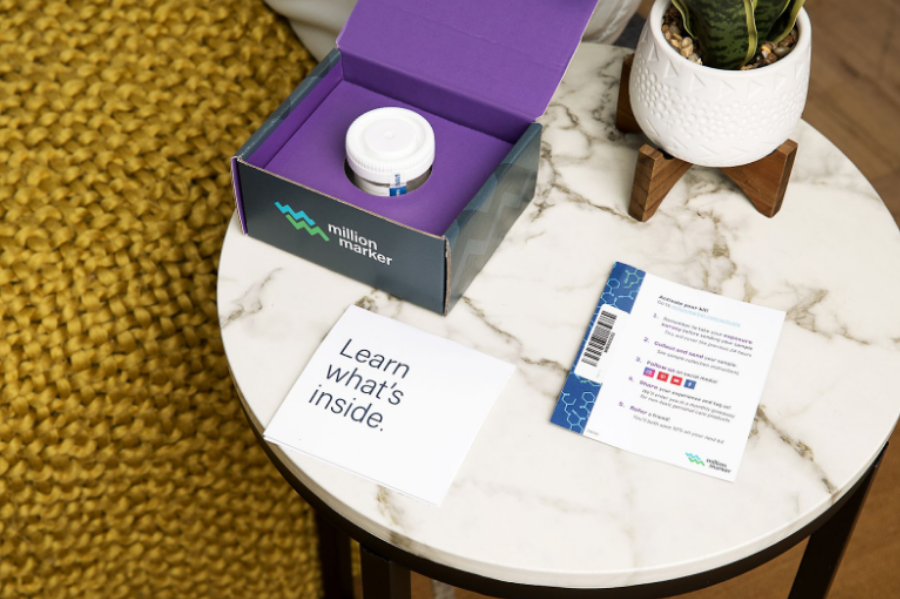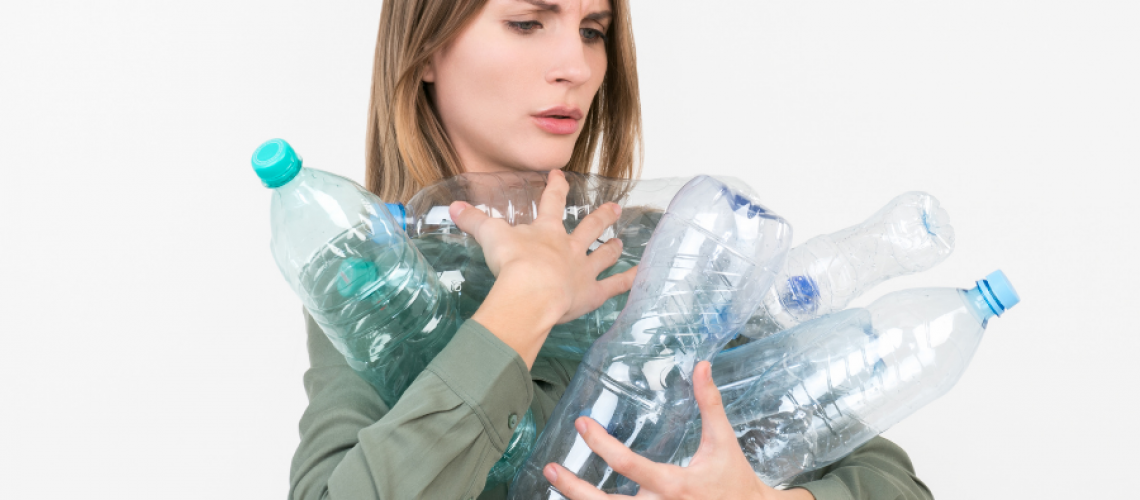Written by Guest Blogger: Dr. Jenna Hua, an environmental health scientist and dietitian by training and founder of the Million Marker.
Plastic is everywhere. We’re not just talking about the obvious suspects, like food and drink bottles, storage containers, and toys. Pharmaceuticals, foods, medical tubes, fragrances, paper receipts, and so much more are also made of plastic or plastic-related chemicals. These chemicals, like BPA and phthalates, mimic estrogen. This throws off hormonal balance and can cause an array of health problems, including weight gain, type 2 diabetes, infertility, and more. Thankfully, a new mail-in urine test helps you detect these chemicals and detox them from your body…and home.
Why Is Plastic Dangerous?
Plastic is so convenient because of its durability. It’s so much easier to carry drinks around the swimming pool, pack sandwiches for lunch, or send the kids off with some extra leftovers, thanks to plastic.
This is what makes plastic convenient for us, but very inconvenient for the environment. It can take thousands of years for a piece of plastic to degrade. Seeing as we produce over 300 trillion tons of plastic per year, that could be a problem.
Plus, plastic is derived from oil. We must take from the earth to create a resource that will pollute the earth for centuries to come.
If environmental reasons aren’t enough, then you should ditch plastic for your health. More and more studies show that our bodies confuse plastic chemicals for estrogen and other hormones, causing them to mess up the healthy hormonal process in our bodies.
Long-term exposure to common plastic chemicals has been linked to:
- Asthma in children
- Eczema in children
- Neurodevelopmental issues in children
- Obesity in adults
- Type 2 diabetes in adults
- Breast cancer in adults
- Fertility issues in adults
Support your health by limiting your exposure to plastic. Let’s discuss common types of plastic chemicals and where you can find them.
Plastic Chemicals to Avoid
Knowledge is a powerful tool for taking the reins back on your health. Once you see plastic in a product, you can’t unsee it. Thankfully, once you see cleaner alternatives, you’ll never unsee those, either!
We’ll start with some of the most common hormone disruptors and then provide you with some tips for detoxing from them.
- Bisphenol A (BPA) – Used to make rigid plastic. Found in water bottles, food packaging, storage containers, can liners, etc. Also found as a coating in thermal receipt paper!
- Bisphenol F (BPF) & Bisphenol S (BPS) – BPA alternatives, can be used in packaging labeled “BPA-free,” can be even more hazardous than BPA
- Phthalates – Class of chemicals used to give plasticity to products, and to disperse scents. Found in detergents, fragrances, plumbing pipes, fluid bags, pharmaceuticals, wood finishing
- Parabens – Artificial preservatives used in cosmetic, oral care, skincare products, and even in food
- Oxybenzone – UV-blocker used in sunscreens, skincare products, and plastic packaging
Chemicals in packaging can contaminate your products. You are literally drinking plastic when you consume bottled water.
Meanwhile, other chemicals are regularly used inside the products. For instance, parabens prevent mold and fungus from growing in lotion. However, it gets absorbed into your skin and interferes with your hormones.
Be sure to read labels. Opt for cleaner formulas that have fewer ingredients, with many of them being ingredients you recognize. Plus, you can follow some of these toxic-free tips.
How to Avoid Plastic Chemicals
Getting rid of plastic can be a challenge, but it’s one you should accept happily! Here are some ways you can avoid plastic and start your health detox journey!
Ways to Avoid BPA/BPF/BPS:
- Use refillable glass or stainless steel water bottles
- Don’t touch receipts
- Vet a brand that claims to be BPA-free to see what materials they use
- Buy organic cloth produce and shopping bags
- Pack sandwiches in reusable bags, or glass/metal/silicone containers
Ways to Avoid Phthalates:
- Don’t buy anything that has fragrance/parfum/perfume
- Shop for phthalate-free piping when making repairs
- Stay away from extended-release tablets for medications, ask your doctor for other options
- Shine up your floors with olive or hemp oil
Ways to Avoid Parabens:
- Look for parabens on labels (ex. methylparaben, ethylparaben, propylparaben, and butylparaben) and avoid them!
- Make your own soaps and moisturizers with shea butter, Castille, and essential oils
- Stay away from products that need preservatives
- Brush your teeth with a toothpaste tablet
Ways to Avoid Oxybenzone:
- Use mineral sunscreen
- Look on ingredients labels for oxybenzone, avobenzone, and octinoxate
- Use a hat, pants, and long-sleeved shirt, find shade under an umbrella or tree when outdoors to limit sunscreen use
How to Test for Plastic Chemicals
The first step to detoxing from plastic is to determine which products are causing the worst burdens. Get tested for these common plastic chemicals with Million Marker’s Detect & Detox Test Kit. You can save $10 at checkout by using the code: Puzzle10

This easy, mail-in urine test measures your levels of BPA, BPF, BPS, parabens, phthalates, and oxybenzone. You will receive a report that tells you which types of products are causing these exposures. That way, you can eliminate them from your daily routine.
Even better, Million Marker provides you with lifestyle and product recommendations. You can even receive exclusive discounts on cleaner alternatives.
The hardest part of the detox journey is done for you. Million Marker lets you know where your toxic burdens are and how to eliminate them. Just enjoy the journey, and a new, low-tox you!
Get Million Marker’s Detect & Detox Test Kit and save $10 with this code at checkout: Puzzle10

Guest Blogger,
Dr. Jenna Hua | Founder, Million Marker
An environmental health scientist and dietitian by training, Dr. Jenna Hua is passionate about the environment, public health and everything food. Jenna holds a BS in Nutrition and an MPH and PhD in Environmental Health Sciences from UC Berkeley, and completed her postdoctoral fellowship at Stanford Medicine.
Frustrated by the lack of data for how harmful chemicals (like BPA, phthalates and parabens) from plastics and everyday products affect our health and clinical outcomes, and the absence of personalized approach to mitigate harmful chemical exposures, Jenna set out on a mission to change these. She founded Million Marker, a health-tech startup dedicated to empowering everyone with the data and tools to determine how the products they use, the food they eat,the water they drink negatively or positively influence their health. Million Marker helps people understand what chemicals are inside of them—and then provides simple solutions for quickly reducing harmful chemicals through mail-in test kits, lifestyle audits, product recommendations, and counseling.
P.S. Catch Dr. Jenna’s interview in this week’s episode of The Hormone P.U.Z.Z.L.E Podcast. You can also find the episode on this podcast page as well as Spotify, and Stitcher. Don’t forget to subscribe, follow, and write us a review on Apple Podcast (if you LOVE it).



